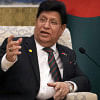Misinformation campaigns and the future of Bangladesh-India relations

After the fall of former Prime Minister Sheikh Hasina last week, Bangladesh was thrown into a critical state of instability and uncertainty. There was no government till Dr Muhammad Yunus took oath as the chief adviser of the interim government on August 8. During this period, the country saw an outburst of violence and crime, which was the outcome of both pent-up political frustration against the ruling party of 15 years and the result of some bigotry, and the machinations of bad actors trying to take advantage of the lawlessness for personal gains. One of the most dangerous situations that can happen in a country is the chaos, crime, and destruction that take place after an authoritarian force is forced to abdicate. Unfortunately, Bangladesh is in such a situation.
However, this issue is not just a domestic phenomenon. Several influential groups inside Bangladesh's largest neighbour have taken the initiative to create a narrative that this momentary lawlessness caused by the thoughtless abdication of the former prime minister is the prelude of a Bangladesh where bigotry and religious fundamentalism are going to flare up.
The main platform where such notions are being sensationalised at the moment is X, formerly known as Twitter. Many verified accounts on X are reporting rumours as actual news and sometimes just outright propagating fake news. What's worse is that this propagation of fake news has also been noted in Indian mainstream media, as well as among popular Indian social media personalities.
It is true that there have been concerning reports of violence against minority communities. Bangladesh Hindu Buddhist Christian Oikya Parishad reported 205 incidents of persecution of members of minority communities across 52 districts. Gobinda Pramanik, general secretary of Bangladesh National Hindu Mahajot, recently made a video statement about the matter, in which he said that, after Sheikh Hasina's resignation on August 5, the Hindu community in Bangladesh thought they would be attacked in a massive way and there would be incidents of arson. According to the general secretary, houses of some Hindu leaders of the Awami League who were very active, as well as those of some Muslim leaders, were attacked. He also stated that some opportunistic people attacked a few local temples. Coordinators of the anti-discrimination student movement called for protection of the minority communities, which was answered by many. Leaders of BNP, Jamaat and other parties, too, instructed their functionaries to ensure that Hindu homes were not attacked and temples were protected.
But against this backdrop, we saw Republic TV from India spreading rumours and making strange claims.
The West Bengal Police, in a statement posted from its official Facebook page, stated that the way some local TV channels are reporting on the current situation in Bangladesh is clearly communally inflammatory and against the norms of the Press Council of India. The West Bengal Police urged viewers to exercise their own judgement when viewing this type of coverage and keep in mind that the authenticity of the footage shown by the channel is not verified by any neutral third party. They requested people not to fall into the trap of one-sided, hateful and misleading propaganda.
The sudden upsurge in misinformation and disinformation on Indian social media coincidentally aligns with a seemingly coordinated rise in criminal activities and vandalism all over Bangladesh. Inside the country, some people are also taking to social media and calling this another attempt by pro-AL forces in India, as well as RAW, to fabricate a narrative of communalism in order to plunge Bangladesh into further unrest and instability. Needless to say, there is no evidence for any of this. Rumours beget rumours. This kind of misinformation treadmill needs to be stopped immediately lest it leads to further instances of violence, and makes the people-to-people divide between Bangladesh and India even worse.
Although it seems the Indian authorities have overtly asked for people to stop propagating fake news regarding what is happening in Bangladesh, there are many in India who firmly believe that Bangladesh is about to fall under a fundamentalist rule the moment the next general elections are held. It almost feels like, with the fall of Sheikh Hasina, some elements in India are behaving as though India has suffered a great loss. It is my humble opinion that, instead of immediately choosing to take the easily monetisable culture-war talking points, the enlightened Indian cultural leaders should first push for a democratic Bangladesh where actual political discourse can take place without fear of getting killed or disappeared by security forces. The people of Bangladesh don't need to be kept "in check" by a convenient autocrat. That is the narrative of a now-disgraced political party that has proven to lie repeatedly to the people and the world to keep power. The people of India must not fall for this narrative ever again.
India must realise the shortcomings of its foreign policy regarding Bangladesh. These should be fundamental lessons from history. Never trust a dictator to keep power. A robust and mature democracy is the only reliable international partner. Right now, India needs to revamp its approach towards Bangladesh entirely. Now is the time for genuine track 2 diplomacy. It is time for genuine people-to-people relations to ensure long-term, sustainable friendship with its most significant geostrategic partner. And this kind of change must start at home.
Zillur Rahman is the executive director of the Centre for Governance Studies (CGS) and a television talk show host. His X handle is @zillur.
Views expressed in this article are the author's own.
Follow The Daily Star Opinion on Facebook for the latest opinions, commentaries and analyses by experts and professionals. To contribute your article or letter to The Daily Star Opinion, see our guidelines for submission.

 For all latest news, follow The Daily Star's Google News channel.
For all latest news, follow The Daily Star's Google News channel. 










Comments